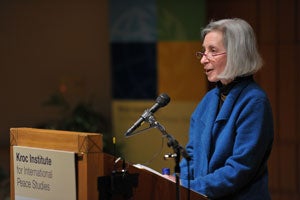“Realistically in democracies, diplomatic and military action will not be taken without the support and pressure of voters, who can learn and can be mobilized through education about the cost of mass atrocities and the potential to prevent them. Education, more fundamentally, can equip people to see warning signs and to resist recruitment to participate in or stand by as mass atrocities occur.”
This was the message delivered by HLS Dean Martha Minow in the 16th annual Rev. Theodore M. Hesburgh, C.S.C., lecture in Ethics and Public Policy, at Notre Dame University on March 16th.
The lecture, presented by Notre Dame’s Kroc Institute for International Peace Studies, focused on education as a tool in preventing violent conflict, as well as the role of the International Criminal Court in jumpstarting and promoting education as a tool in fostering coexistence and peace. Minow proposed exploring how the Assembly of Member States, created by the Rome Statute authorizing the Court, could take a leadership role in devising developing effective educational strategies and relevant research.
Minow spoke of the impulse for education after international, interethnic or interracial conflict. “Education offers the chance to shape the hearts and minds and behaviors of the next generation,” she said. “If we can educate young people to respect others, to avoid stereotype … to develop tools for resolving disputes, to stand up to demagogues, to be peacemakers … we might hope to prevent future violence.”
Memoriesthat adolescents in particular hold onto after living through inter-group conflict, she said, will inform their attachments to ideas about national and political struggles, and notions of truth and justice.
Educational change “must be part of the more comprehensive effort to alter the conditions in which interwar conflict arises,” Minow said.
On the role of the International Criminal Court, Minow highlighted the dangers of thinking of international justice as operating “outside or above” each nation.
The annual Hesburgh lecture was established by Notre Dame’s Kroc Institute for International Peace Studies, in honor of Rev. Theodore M. Hesburgh, C.S.C., president emeritus of Notre Dame. Recent Hesburgh lecturers have included Nobel Peace Prize Laureate Shirin Ebadi, Harvard ethicist Rev. J. Bryan Hehir and former United Nations Undersecretary General Shashi Tharoor.
Of Hesburgh, who was present at the lecture, Minow said, “There is no one I admire more than Father Ted. His leadership in education, civil rights and peace is associated with the very best moments of American history for as long as I can remember.”
Minow is an expert in human rights and advocacy for members of racial and religious minorities, as well as for women, children and persons with disabilities. She has served on the Independent International Commission on Kosovo and helped launch Imagine Co-existence, a program of the U.N. High Commissioner for Refugees, to promote peaceful development in post-conflict societies.
At Harvard Law School, she teaches civil procedure and constitutional law. Minow’s books include “Partners, Not Rivals: Privatization and the Public Good;” “Between Vengeance and Forgiveness: Facing History After Genocide and Mass Violence;” “Not Only for Myself: Identity, Politics and Law;” and “Making All the Difference: Inclusion, Exclusion, and American Law. “ Her latest book is “In Brown’s Wake: Legacies of America’s Educational Landmark” (forthcoming).
